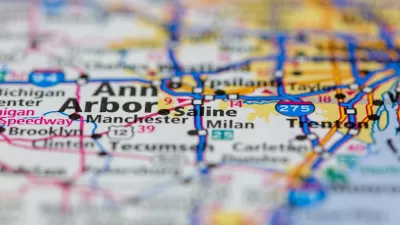States are developing a variety of mechanisms for replacing dwindling gas tax revenue, which most rely on for the majority of their transportation funding.

More states are implementing policies aimed at replacing lost revenue from gas taxes, which are bringing in less money as more electric vehicles hit the road and have “traditionally been a critical source of funding for transportation infrastructure,” according to an article by Jared Brey in Governing.
Brey notes that “A national pilot program to collect VMT fees in place of gas taxes is expected in the next few years.” Meanwhile, over half of U.S. states have some kind of fee for electric vehicles to offset the lost revenue, but a recent report from the MIT Mobility Initiative reveals that “most aren’t high enough to replace the revenue the average driver pays in state gas taxes each year.”
“The need to replace the gas tax is also a chance to build a ‘more rational transportation funding system,’ the report says — one that accounts for all the ways that cars wear on infrastructure and the environment, whether they’re electric or gas-powered.” In 2006, Oregon launched the nation’s first voluntary VMT-based fee program, which “allows drivers to opt in and pay a 1.8-cents-per-mile fee and get a credit against gas taxes paid.”
At the federal level, the Department of Transportation is tasked by the Infrastructure Investment and Jobs Act with developing a pilot program to “test the design, acceptance, implementation and financial sustainability” of VMT fees, but Garett Shrode, a policy analyst at the Eno Center for Transportation, says the department is “dragging its feet” and “should focus on simplicity, and on finding ways for federal and state VMT programs to overlap.”
FULL STORY: Clock Ticking for States to Replace Dwindling Gas Taxes

Planetizen Federal Action Tracker
A weekly monitor of how Trump’s orders and actions are impacting planners and planning in America.

Maui's Vacation Rental Debate Turns Ugly
Verbal attacks, misinformation campaigns and fistfights plague a high-stakes debate to convert thousands of vacation rentals into long-term housing.

Cuomo Is the Candidate of Both NIMBYs and Developers. What Gives?
In the New York City mayoral race, odd bedfellows align to preserve the housing status quo.

San Antonio and Austin are Fusing Into one Massive Megaregion
The region spanning the two central Texas cities is growing fast, posing challenges for local infrastructure and water supplies.

Charlottesville Temporarily Has No Zoning Code
A judge ordered the Virginia city to throw out its newly revised zoning code, leaving permitting for new development in legal limbo.

In California Battle of Housing vs. Environment, Housing Just Won
A new state law significantly limits the power of CEQA, an environmental review law that served as a powerful tool for blocking new development.
Urban Design for Planners 1: Software Tools
This six-course series explores essential urban design concepts using open source software and equips planners with the tools they need to participate fully in the urban design process.
Planning for Universal Design
Learn the tools for implementing Universal Design in planning regulations.
Heyer Gruel & Associates PA
JM Goldson LLC
Custer County Colorado
City of Camden Redevelopment Agency
City of Astoria
Transportation Research & Education Center (TREC) at Portland State University
Jefferson Parish Government
Camden Redevelopment Agency
City of Claremont





























